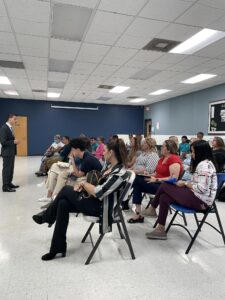In Louis Malle’s classic 1980 film, Atlantic City, Burt Lancaster’s character stares wistfully out from the Boardwalk. “You should have seen the Atlantic Ocean in those days.” The response he gets is a quizzical look. After all, the ocean is always the ocean. Right?
Maybe, but Atlantic City is not always Atlantic City. It changes -as most cities do – from periods of growth and prosperity to periods of despair and problems. As Michael Pollock, author of “Hostage to Fortune: Atlantic City and Casino Gambling, often notes: “With Atlantic City, the lurches from euphoria to despair simply occur more frequently, and the best metaphor for Atlantic City is that of a Boardwalk roller coaster. How the city looks depends on when you open your eyes during that ride.”
That 1980 Louis Malle snapshot was taken just after the grand urban “experiment” with casinos had begun, and Atlantic City was a different type of metaphor. It was a place for reinvention. We all know how the story of Atlantic City evolved from there: Prosperity in the early 1980s, followed by despair in the late 1980s, followed by prosperity in the mid-1990s, followed by . you get the picture.
As this column is being written, the sun is shining, the sky is blue, and the Boardwalk is filled with visitors who have both time and money to spend. Atlantic City appears to be emerging from a period of deep despair, as the remaining casinos are showing growth, and a number of non-gaming investments are being opened, planned or considered. Such projects range from capital investment in Boardwalk Hall to a proposed waterpark complex at the shuttered Atlantic Club to the newly opened, still-expanding Playground (formerly The Pier at Caesars) and other attractions.
This is clearly a period of optimism, but does that mean the Atlantic City pendulum is swinging back toward a period of euphoria? In part, yes, because Atlantic City is slowly but surely leveraging its natural attractions – the beach, Boardwalk and tourism infrastructure – and growing less dependent on its core industry: casino gambling, which is by definition a risky foundation since it is so easy for other markets to emulate.
Those of us who live and work in this important market recognize that prosperity cannot be built on a foundation of a legal monopoly, with hopes that are pinned on maintaining that monopoly. Atlantic City’s old business model of being the most convenient place to gamble is a mode that is metaphorically (and somewhat literally) built on sand.
Atlantic City’s future is as an entertainment center, and if that sounds suspiciously like its past, so be it. The city needs more capital investment, but it needs something else as well: longer season.
I suggest you heed the words of Steve Norton, a venerable observer of gaming who played an instrumental role in building Atlantic City when he served as Executive Vice President of Resorts International, back in the 1970s. He recently wrote: “These new additions are great for Atlantic City, but they will still attract most customers during the summer months and on Fall and Spring weekends. Vegas has changed from 70 to 80% dependence on casino win, to a very balanced revenue mix, where casino win only represents 35% to 40% of most resort casino revenue.”
Norton suggests – and I wholeheartedly endorse – a further emphasis in Atlantic City on conventions and meetings, further emulating the Las Vegas model.
Norton further writes: “That market is even more perfect for Atlantic City, because the meetings market primarily plan their events during the Fall, Winter and Spring, and almost exclusively mid-week. And since the attendees are attending a work event, they are getting paid, and their travel, accommodation and meals paid for by their employers. We have the first class hotels, a variety of quality dining and entertainment venues; but Atlantic City lacks first class transportation. And taking a bus from Philadelphia International is not an acceptable solution, especially when we have a first-class airport 9 miles away. Air service is the major missing ingredient, to create a smaller version of Las Vegas right here in South Jersey.”
Las Vegas in South Jersey. Does that sound familiar? It should. That is what New Jersey tried to do when it legalized casinos in Atlantic City, but here is the real lesson from Las Vegas: When times get tough, reinvent yourself.
Louis Malle got it right. The Susan Sarandon character in his movie tries to reinvent herself, and indeed the entire film is a metaphor for reinvention and starting anew. Bruce Springsteen also got it right, with these lyrics:
“Everything dies baby that’s a fact. But maybe everything that dies someday comes back. Put your makeup on fix your hair up pretty and meet me tonight in Atlantic City.”
You don’t need to recite lyrics or see movies to know that Atlantic City is all about reinventing itself, and coming back.
Lloyd D. Levenson is Chief Executive Officer of the Atlantic City-based law firm Cooper Levenson and Chairman of the firm’s Casino Law Practice Groups in Atlantic City, Las Vegas and Harrisburg, Pennsylvania (www.cooperlevenson.com). Mr. Levenson can be reached at (609)344-3161 or by e-mail at ldlevenson@cooperlevenson.com.








